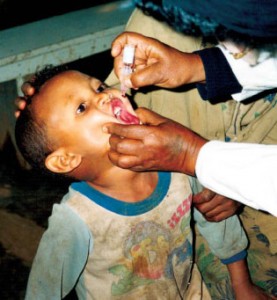McLaughlin-Rotman Centre for Global Health
Apr 20, 2010
55th anniversary of first polio vaccine
 Failure to pursue eradication of polio worldwide given the capacity and opportunity to do so is a violation of ethical principles, foremost among them a “duty to rescue” those in distress, according to ethicists writing in this week’s edition of the Lancet.
Failure to pursue eradication of polio worldwide given the capacity and opportunity to do so is a violation of ethical principles, foremost among them a “duty to rescue” those in distress, according to ethicists writing in this week’s edition of the Lancet.
Claudia Emerson, PhD, Program Leader in Ethics, and Peter A. Singer, MD, Director of the Canadian-based McLaughlin-Rotman Centre for Global Health (MRC) at the University Health Network and University of Toronto, present a series of compelling arguments that completing polio eradication is an ethical imperative.
They say the polio eradication agenda in recent years has largely centered on questions of economic and technical feasibility and has come under fire from opponents who strongly support an ‘effective control’ strategy. However, it is estimated that this alternative to eradication would result in 4 million children contracting polio in the next 20 years.
The authors introduce a moral justification for eradication to the debate, asking: “How can we ethically justify this course of action when the opportunity and means to rescue are available?”
Full news release text, click here
Coverage summary, click here
Example coverage, by Asian News International Newswire, click here, by the InterPress News Service newswire, click here, by the Globe and Mail, click here